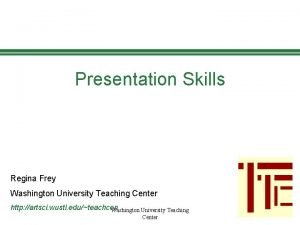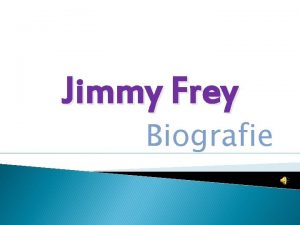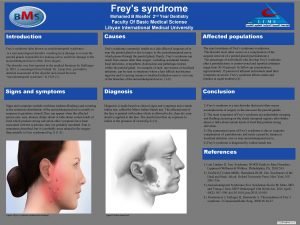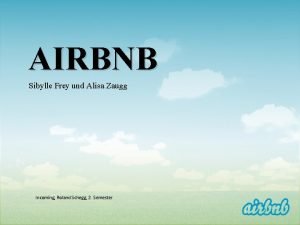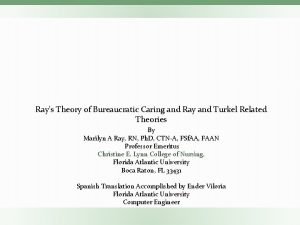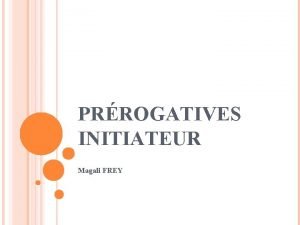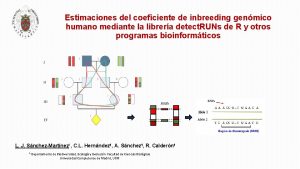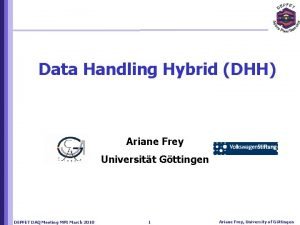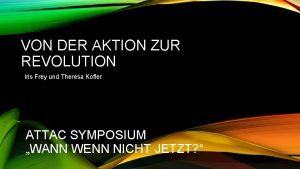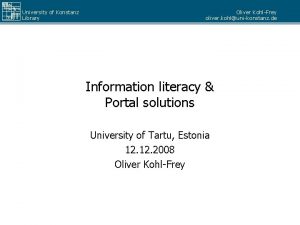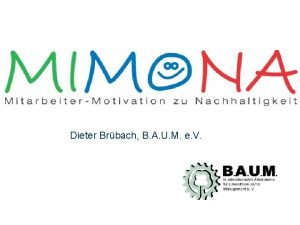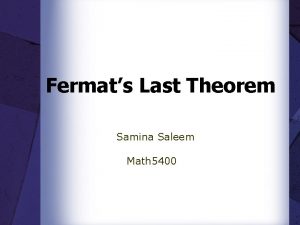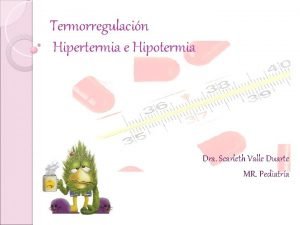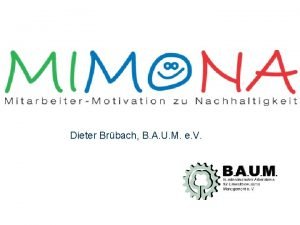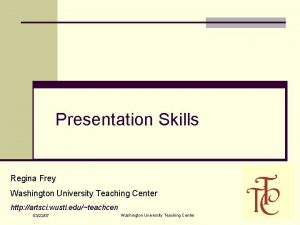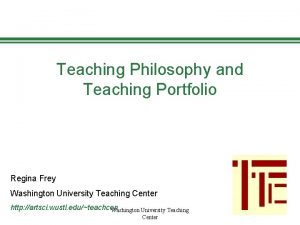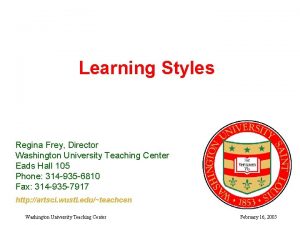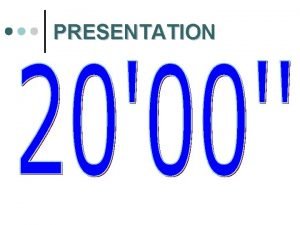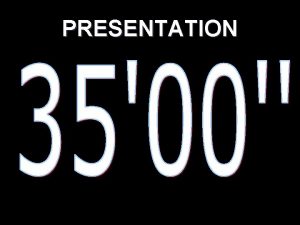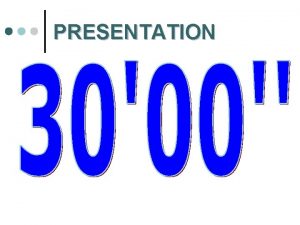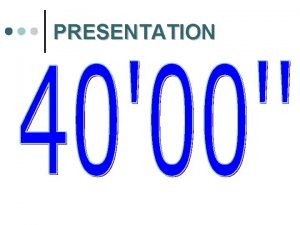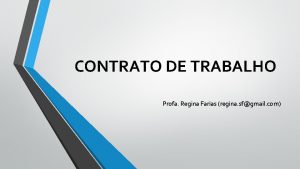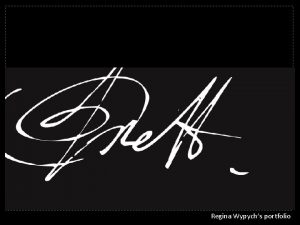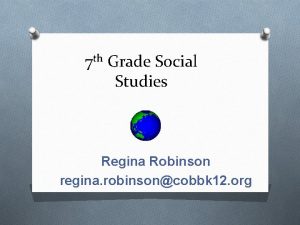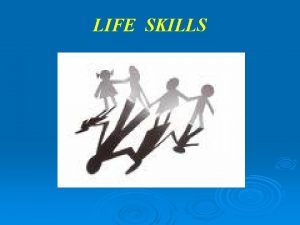Presentation Skills Regina Frey Washington University Teaching Center



















- Slides: 19

Presentation Skills Regina Frey Washington University Teaching Center http: //artsci. wustl. edu/~teachcen Washington University Teaching Center

“Effective lecturers combine the talents of scholar, writer, producer, comedian, showman, and teacher in ways that contribute to student learning. ” (W. J. Mc. Keachie) Washington University Teaching Center 3/20/06

Principles of Effective Talks l Communicate your arguments and ideas l Persuade your audience the arguments and ideas are valid l Be interesting and entertaining Washington University Teaching Center 3/20/06

Outline l Students l Content and Organization l Delivery and Style l Visual Aids l Questions and Answers Washington University Teaching Center 3/20/06

Students l What are the backgrounds of the students l What is the size of class l What is the class’s knowledge of the subject l Why did the students (participants) come (or sign up for the class) l What are the students’ expectations Washington University Teaching Center 3/20/06

Organization of Content l Students listen between 25 – 50% of the time l Information must be taken in immediately, no backtracking is possible n Short-term memory holds 5 -7 points n People remember only 10% of what they hear and 50% of what they see l Organize class session to help students to listen and remember Washington University Teaching Center 3/20/06

Cone of Learning We Tend to Remember 10% 20% 30% 50% 70% 90% Our Level of Involvement Reading Hearing Words Looking at Pictures Watching a Movie Looking at an Exhibit Watching a Demo Seeing it Done on Location Passive Participating in a Discussion Giving a Talk Doing a Dramatic Presentation Simulating the Real Experience Active Doing the real thing Reference: Engineering Education: Preparing for the Next Decade. Study by Arizona State University, December 1991. Washington University Teaching Center 3/20/06

Organization-of-content Skills l l l Teaching has features of a presentation or speech Have an introduction, body, summary n Begin each class with a list objectives or outline n End with an interesting problem or question Have a theme or storyline for course content n Give context for the material n Make smooth transitions between topics Student attention span is 15 -20 minutes Give wait time in class Washington University Teaching Center 3/20/06

General Presentation Skills l l l l Use the classroom as a stage (move around) Think about the size of the classroom Have a presence; develop a teaching persona Prepare yourself emotionally for class Show passion/enthusiasm for the topic Be able to laugh at yourself Practice your lecture; practice in the classroom if possible n Add “performance notes” to your lecture notes n Do not “read” your lecture notes l Be aware of student responses Washington University Teaching Center 3/20/06

Speaking Skills l l l Speak clearly and loudly (use microphone in a large room) Do not speak too rapidly or too slowly Do not use filler words (“um”, “you know”) Vary voice pitch and speed Use pauses correctly n Emphasize important content n Allow students to assimilate information or to respond to questions and humor Washington University Teaching Center 3/20/06

Nonverbal Skills l l l Do not let the instructor’s desk or podium form a barrier Make true eye contact; interact Use gestures and facial expressions, appropriately Move with certainty and assuredness (be careful not to seem pompous) Move in the room appropriately with the structure of the lecture Washington University Teaching Center 3/20/06

Board and Visual-aid Skills – Design Hints l l l l Choose color scheme and font for clarity. Keep the design simple. Put a title on each visual. Limit number of ideas on each visual. Use color for emphasis. Use illustrations sensibly and tie them closely to the idea presented. Use horizontal (landscape) shape, not vertical (portrait). Washington University Teaching Center 3/20/06

Board and Visual-aid Skills – Text Considerations l Use single words or phrases l Use short quotes, and not long extracts from documents l Use summary lists l Organize the information visually in addition to content Washington University Teaching Center 3/20/06

Board and Visual-aid Skills – Presentation Considerations l Before classes start, check out classroom and presentation equipment n Book the presentation equipment in advance, if necessary l Check on the placement of the speaker relative to: n Class n Screen or chalkboard n Technology l Use too few visuals rather than too many n However, exactly the right number of visuals is the goal! Washington University Teaching Center 3/20/06

Board and Visual-aid Skills – Chalkboard l l l Write legibly and large enough to be seen in the back of the room Think about the organization of the material on the board n Fill one board at a time n Do not scrunch in words at the very bottom of the board (or in the margins of the board) n Erase a board only when you have run out of room Underline or mark major assumptions, conclusions, etc. Use color to clarify points. n Check which colors are most visible Do not erase mistakes on previous boards n Cross out and write the correction in n That is what the students must do Washington University Teaching Center 3/20/06

Question and Answer Session l Prepare for questions n Think of questions that could be asked l Listen to the entire question before answering l Pause to allow yourself time to evaluate the question and the person who asked it n Pause, even when you know the answer right away l Rephrase the question out loud n Ensures that everyone hears the question n Ensures that you understand are answering the question that was asked n Gives you additional time to formulate a response Washington University Teaching Center 3/20/06

Question and Answer Session l Credit the person for asking the question n “That is a good question” n “Thank you for asking a question” l Answer the question as honestly and the best that you can n Do not fake an answer n If you do not know, say so. However get back to them with an answer, if possible l Ask the questioner if you have answered his or her question before moving on Washington University Teaching Center 3/20/06

l Good oral communication can be learned. l Practice is essential. l Enjoy yourself! Washington University Teaching Center 3/20/06

For more teaching tips, visit our website! http: //artsci. wustl. edu/~teachcen Click on Teaching Assistants Washington University Teaching Center 3/20/06
 Regina frey
Regina frey Jimmy frey wikipedia
Jimmy frey wikipedia Leeftijd jimmy frey
Leeftijd jimmy frey Frey syndrome symptoms
Frey syndrome symptoms Sibylle frey
Sibylle frey Klaus dieter frey
Klaus dieter frey Frey’s syndrome
Frey’s syndrome Marilyn anne ray theory of bureaucratic caring
Marilyn anne ray theory of bureaucratic caring Magalie frey
Magalie frey Coeficiente de inbreeding
Coeficiente de inbreeding Ariane frey
Ariane frey Iris frey attac
Iris frey attac Oliver kohl-frey
Oliver kohl-frey Frey gebäudereinigung
Frey gebäudereinigung Dr samina saleem reviews
Dr samina saleem reviews Sindrome de frey
Sindrome de frey Hans dieter frey
Hans dieter frey Frey gebäudereinigung
Frey gebäudereinigung David frey 12 step sales letter
David frey 12 step sales letter Alan frey
Alan frey
